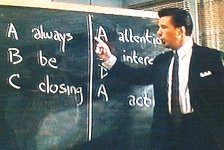The Assumptive Closing Technique

“A-B-C. A-Always, B-Be, C-Closing. Always be closing, always be closing”
Alec Baldwin as Blake in Glengarry Glen Ross
As professional salespeople we all learn at an early stage that the key to making money is to close deals. Many sales people fall into the trap of asking for the order to soon or in many cases NOT asking for the order at all. My personal selling style is based around one of the most popular closing techniques, the Assumptive Close.
The basic technique is for the sales person to “act as if” the other person has already made the decision to buy and with this in mind, the conversation can focus toward the next level of questions.
As an television advertising sales person, I will often take the prospect to the next level by asking questions like:
- Do you have any concept ideas for your TV commercial?
- Would you want to run this into the Fall?
- Will the TV creative need to be updated on a regular basis?
At this point one of two things will happen. First and most often, the person will move with you to the next step. It’s natural for them to stay in a positive light and unless you are totally off base, the conversation will continue in a forward fashion.
Second and less often, the person will automatically put the breaks on and say something like “whoa…we aren’t ready to go to the next step yet”. This is an excellent opportunity for the sales person to ask a direct question like “what is holding you back from making a decision today”? The first thing out of the prospects mouth will likely be the most important barrier to a successful closing of the business. If they say something like “the timing is not right for us”…the next question from you would be something like “when would be a good time”? This will get you back on the Assumptive Close selling track.
The Assumption Principle
There’s more working for you when you use the Assumptive Close technique and this is why it is so popular. The Assumption Principle works on the basis that if you are a believable person and you act as if something is true…the person you are talking to will likely believe it as well! If you start acting as if something is true (the person will be buying your product) the person can either believe that you are telling the truth and agree with you OR they can NOT believe you. The later reaction is less likely to occur especially if the salesperson has invested the time in rapport and credibility building with the prospect.
If you believe the deal is already closed, it is likely you will spend your valuable time learning more about the clients needs.
It's as easy as A-B-C!
Mitch Drew
<< Home